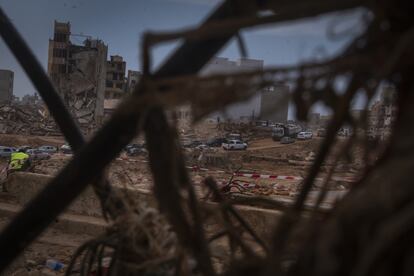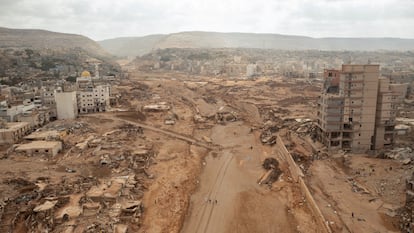In Derna, mud is now the worst enemy
Volunteers from all over the country, international firefighters, and soldiers from Field Marshal Haftar’s army are working to clear the rubble to recover the dead

With the floodwaters’ progressive retreat, Derna has a new worst enemy: mud. In much of this city of 120,000 inhabitants in eastern Libya, the thick sludge remains knee-deep. Meanwhile, volunteers from all over the country, international firefighters, and soldiers from Field Marshal Khalifa Haftar’s army (which controls the eastern half of the country) are working to clear the rubble and recover the dead. In recent days, the search at sea has focused on the port, the place where the flood dragged thousands of people after torrential rain from Storm Daniel caused two nearby dams to collapse. The figures released by the rescuers at this point are devastating: 800 bodies recovered, and only nine people found alive. There is no official toll, but estimates are around 20,000 victims, including dead and missing throughout the area.
An excavator tries to drag one of the four cars that have formed a column blocking a downtown street. Four men strive to make the task easier, moving earth aside with the help of shovels and their own hands. They put their arm up to the shoulder through the window to check that no one was trapped inside. The car emerges from the mountain of debris and is transported to an area of open ground that has been converted into a temporary scrapyard. Rida, who does not want to give her last name, covers her face with an FFP2 mask, which the army has begun to distribute at the catastrophe’s ground zero. “I am from Misrata. I came to help as soon as I found out what happened. We stop clearing debris only to sleep. There is no rest. Then, we look around and see everything we have left to do,” she explains while still looking inside the car.
Derna has gone from being a ghost city, in which there were only groups of volunteers, military, and international firefighters, to a kind of battlefield full of people trying to help in the reconstruction. That includes those who have lost everything. Covered in mud up to his eyebrows, Abdelhamid stands barefoot in the doorway of his house. He can barely make it to the living room, where a construction cart blocks the way to the bedrooms. “The water reached the ceiling. My wife, my daughters, and I were saved because we went up to the third floor and the building held up. But most of our neighbors are dead,” he explains before joining the group that, in a single day, has cleared 10 cars from the road.

A few meters away and with the aid of a crutch, Amrajeh Gadur walks with difficulty. “When the flood started we ran to the roof. Then we realized that my little sister was not there. We had to wait for the waters to subside, and then we found her body in the kitchen.” The boy asks a group of men what he can do to help. There is more of a need than the means to be useful.
“We have recovered 800 bodies and only nine people alive in the port,” explains Commander Mohaned Alshahiebi, responsible for coordinating the search at sea, one of the main scenes of this humanitarian tragedy. Some of the soldiers who have participated in collecting the deceased from along the coast admit that their work is becoming more and more difficult. Thanks to the tracking carried out by helicopters and army drones, bodies are located in the most inaccessible places on the coast, but their state of decomposition makes the task difficult.
It is the military who are directing debris removal work in order to begin on reconstructing the nine bridges that connected the eastern and western parts of the city and that were washed away by the flood. It is still not known when electricity, running water, and sanitation (already poor before the catastrophe) will be restored, but they will be essential to avoid possible epidemics in the coming weeks.
Recover and rebury
“There is so much to do that it is difficult to know where to start,” explains Yousef Jalal Alfietori, a nursing assistant based in Benghazi, as he looks around. As the week has progressed, traffic has become more intense in Derna. Ambulances, humanitarian aid trucks, United Nations SUVs, and cars full of civilians continue to arrive. However, much of the volunteers’ efforts continue to be concentrated on the need to remove the rubble, earth, and mud under which an untold number of people remains buried. Recovering the dead from the debris and reburying them safely — that remains the main mission.
A few meters away, in the city’s port, soldiers from Khalifa Haftar’s navy prepare to receive his son, Saddam. A week after unprecedented rains and the collapse of the two dams that caused this tragedy, the man known as “Brigadier” has toured the worst hit areas in a military convoy and has listened to the assessments of those in charge of the response to the humanitarian crisis at a meeting organized in the port of Derna.
The ruler’s son met a group of Spanish firefighters who, after days of trying, managed to travel to Libya on Thursday to take part in the rescue. Four days later they will return to Spain due to the fading hope that there will be any survivors still trapped. Saddam Haftar has also listened to the Italian soldiers deployed to the area. The Italian Prime Minister, Giorgia Meloni, maintains close collaboration on immigration matters with the two opposing Libyan governments: Haftar’s and Albdelhamid Dabeiba’s, which controls the western part of the country.
“We knew that Derna was built on a natural channel with two dams holding back millions of gallons of water. And that was something dangerous. But something so horrible cannot just be the product of a natural disaster,” laments Taofek Rafah, an elderly man who observes what is happening around him and needs to express his pain. “It has to be God’s will.”
Sign up for our weekly newsletter to get more English-language news coverage from EL PAÍS USA Edition
Tu suscripción se está usando en otro dispositivo
¿Quieres añadir otro usuario a tu suscripción?
Si continúas leyendo en este dispositivo, no se podrá leer en el otro.
FlechaTu suscripción se está usando en otro dispositivo y solo puedes acceder a EL PAÍS desde un dispositivo a la vez.
Si quieres compartir tu cuenta, cambia tu suscripción a la modalidad Premium, así podrás añadir otro usuario. Cada uno accederá con su propia cuenta de email, lo que os permitirá personalizar vuestra experiencia en EL PAÍS.
¿Tienes una suscripción de empresa? Accede aquí para contratar más cuentas.
En el caso de no saber quién está usando tu cuenta, te recomendamos cambiar tu contraseña aquí.
Si decides continuar compartiendo tu cuenta, este mensaje se mostrará en tu dispositivo y en el de la otra persona que está usando tu cuenta de forma indefinida, afectando a tu experiencia de lectura. Puedes consultar aquí los términos y condiciones de la suscripción digital.








































